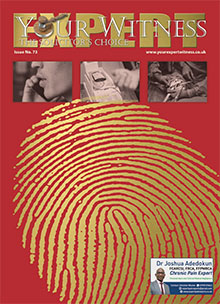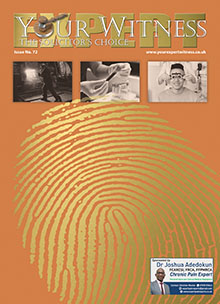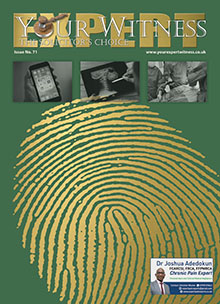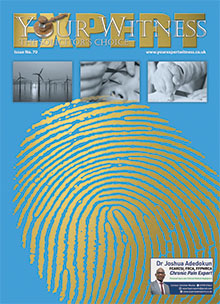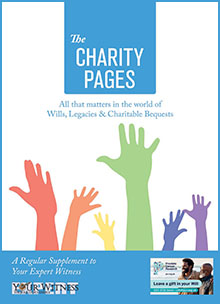TV’S DANGERFIELD is probably the best known UK ‘police surgeon’ (the former colloquial name for the present day ‘forensic physician’) and partly comparable to the USA’s Quincy. The reality, however, is that I spend most of my time examining detainees held in police custody to establish their medical and psychological fitness to be detained, to be charged and to be interviewed by the police.
Forensic physicians also attend scenes of sudden or unexpected death to assist the police in establishing whether circumstances might suggest an unnatural or suspicious death that warrants further investigation. They examine victims and suspects in assault cases; as such they must acquire particular expertise examining and recording the precise appearance of wounds in order to determine whether the account of timing and mechanism of injury is consistent with the observed findings.
Forensic physicians are also crucially involved in the examination of victims and suspects of serious sexual offences and the associated harvesting of intimate samples for forensic evidential purposes. That requires additional specialised training and expertise.
Another function is the examination of those suspected of involvement in drink/drug driving offences, including assessments for clinical evidence of impaired driving and to exclude any medical or psychological conditions that might account for apparent impairment – I once examined a driver involved in a RTA who was unable to walk a straight line not due to the effects of alcohol or drugs but because he had suffered a mild stroke that warranted hospital assessment.
Injury interpretation
Medical opinion sought in relation to injury interpretation is probably the commonest reason that an expert medical report is commissioned from a forensic physician. Forensic physicians regularly see fresh injuries, both before and after treatment, in addition to seeing injuries that have started to heal spontaneously in the absence of treatment. Detailed consideration of the reported history in witness statements is vital in establishing whether or not the account is consistent with observed injuries.
Drink/drug driving cases
Forensic physicians are regularly instructed to undertake expert court work relating to drink and drug driving cases. Substantial case law exists documenting cases where police officers have overlooked reasonable medical excuses for a driver’s inability to provide a specimen of breath or blood. In such cases, where drivers face the charge of ‘failing to provide’, reasonable medical excuses can include anxiety/panic attack symptoms, respiratory disease such as asthma, or in the case of a request for a blood sample, needle phobia. The police ‘drink drive’ procedural paperwork contains specific guidance directing the police to clarify the nature of any reported medical reasons for non provision. The paperwork/procedure relating to drink and drug drive offences is notoriously disjointed and often results in the process being followed poorly, leaving room for procedural errors that can result in cases being dropped.
Questionable fitness for interview
Forensic physicians are sometimes involved in expert court work in order to establish whether a detainee may have been at risk in a police interview, ie if anything they say about their involvement or suspected involvement in an offence about which they are being interviewed might be considered unreliable in subsequent court proceedings as a direct result of their physical or mental state. If that is found, then the interview is usually deemed inadmissible.
The police can sometimes overlook a detainee’s psychological, physical or educational learning vulnerabilities and interview a suspect who may have naively declined all legal advice and representation. In such cases it is possible that the suspect does not have sufficient insight into the gravity of the allegation and associated legal implications.
It is equally possible that this group of vulnerable individuals are at risk of making false confessions during interview, particularly if they have a compliant personality and the associated desire to seek approval from others. Detainees in this category can have considerable difficulties contradicting police assertions when subjected to interrogative pressure in an interview setting.
Another group of vulnerable individuals commonly in police custody are drug and/or alcohol misusers. Those individuals are at greater risk of having memory impairment in relation to recent events that are possibly the subject of police interview. That group is therefore at risk of mistrusting their own memory or have frank memory impairment to the degree that they are suggestible to the extent that they are gradually convinced or persuaded into making a false confession.
Individuals that are drug or alcohol dependent are also at greater risk of making false confessions fuelled by the fear of suffering withdrawal symptoms in custody. The suspect may give in to the demands and pressure of interviewers due to the false perception that false confession might facilitate immediate gain in the way of release from custody. That group presents a complex challenge to forensic physicians since there exists a window of optimal ‘fitness for interview’, some time between an individual’s initial drug or alcohol intoxicated state upon arrest, and the state of progressively worsening withdrawal symptoms that follow.



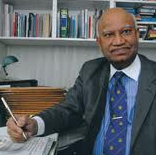 “Speculate before you accumulate. I am a long term regular writer and advertiser in 'Your Expert Witness - the Solicitor’s Choice'. This investment pays me substantive dividends; I get more Expert Witness work with every issue. Not only solicitors and barristers but also judges seem to read it. It is a win-win situation. Success breeds success; I must continue to write and advertise.”
“Speculate before you accumulate. I am a long term regular writer and advertiser in 'Your Expert Witness - the Solicitor’s Choice'. This investment pays me substantive dividends; I get more Expert Witness work with every issue. Not only solicitors and barristers but also judges seem to read it. It is a win-win situation. Success breeds success; I must continue to write and advertise.”












